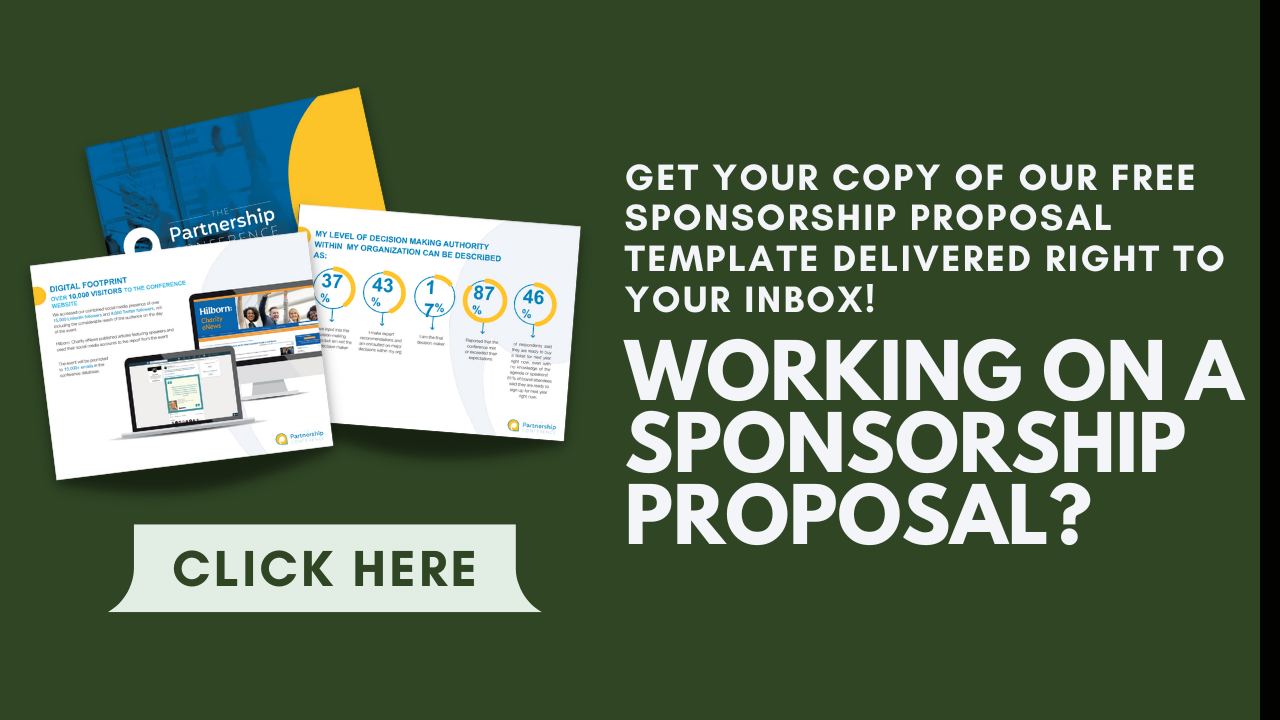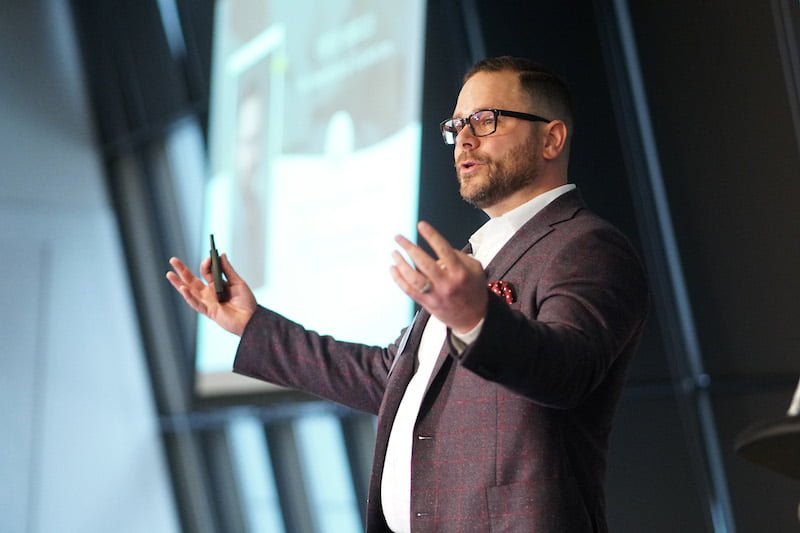Here at the Sponsorship Collective, I’m all about providing you with tips and advice for acing your sponsorship program.
Sometimes though, knowing what not to do is just as important. This way, you can avoid critical missteps that your fellow sponsorship seekers have fallen victim to before you.
Today’s post is going to be presented in that vein. I’ll tell you a story of a client of mine who lost a sponsorship deal because of what they did and help you dodge the same kinds of mistakes so you can successfully navigate your sponsorship program.
A Client of Mine Lost a Sponsorship Deal with This Mistake
Okay, so let’s get right into the story that a client of ours experienced. His name is Dave.
Dave was having a conversation with a potential sponsor. This is a good position to be in, right? It’s a spot that I’m sure many of you reading this someday aspire to reach.
According to what he told me, Dave’s prospective sponsor was really excited about the potential deal, which always bodes well. The prospect then asks Dave to send them some information about Dave’s sponsorship opportunity.
I’m sure you’re thinking, “okay, no red flags to this point,” and you’d be incorrect.
You see, what Dave’s prospect told him–to send sponsorship materials–was indeed a red flag.
Dave was part of my community of sponsorship seekers here at the Sponsorship Collective. He made the right call in asking for the community’s advice before he sent the sponsor a thing.
Everyone told him not to send materials, that he should focus on guiding the prospect towards a discovery meeting instead.
If you’re new to this blog or sponsorship in general, a discovery meeting or discovery session is a conversation with the prospect where you learn more about the company’s goals, challenges, and plans.
You ask the questions to unveil the information you seek, whether that’s about the prospect’s target audience, products and services, sales goals, or a little of all three.
So anyway, back to Dave.
Everything seems to be going well for him at this point. He almost fell into a trap, he got good advice, and he ultimately side-stepped the trap, right?
Sadly, no.
You see, Dave had done media monitoring and discovered that he had more than 1.5 million impressions on his sponsorship property.
He thought this was such a gargantuan number of impressions that he decided he wanted to share this information with his prospect.
Now, it’s not like Dave sent sales material. He instead included a couple of bullets about the size of the property, info about his audience, and of course, more details about his 1+ million impressions.
The prospect did respond, and do you know what they said? That 1.5 million media impressions wasn’t a big number in their eyes. Then the prospect said that they weren’t interested in meeting with Dave.
That was it. His deal was off the table.

Here’s What the Mistake Was
So what did Dave do wrong? He gave the prospect what they wanted, so why didn’t they want to meet with him? Is it that Dave’s media impressions were too low?
In this situation, yes, that was a contributing factor. After all, the company he was talking to was a Fortune-500 brand. It would take a lot more than 1.5 million media impressions to win them over.
However, there’s a lot more at play here.
All sponsorship seekers ideally want to present prospects with a custom solution tailored to the prospect’s needs to help them achieve outcomes.
That’s your job on the flipside of sponsorship. The sponsor’s job is then to provide you with funding or promotions.
When you send a prospect information about your opportunity, even if it’s in tidy bulleted form such as was the case for Dave, what you’re doing flies in the face of what you’re telling the prospect.
There’s a Ralph Waldo Emerson quote I like that’s especially fitting in a scenario like this. The quote is: “Your actions speak so loudly, I cannot hear what you are saying.”
Or, to boil it down more simply, I’ll use the common idiom that actions speak louder than words.
You can tell your sponsor that you want to offer them customized solutions until you’re blue in the face.
If you then send them sales materials or sponsorship proposals that assume you know what a sponsor’s goals are without asking about it first, then you don’t really care about custom solutions, do you?
You care about the solutions the way you’ve crafted them.
Now, maybe that’s not true. Perhaps this was all unintentional. Well, as Dave’s story proves, it doesn’t really matter. Actions speak louder than words.
If you want to offer tailored solutions to your prospects, then you’ll schedule a discovery session. You won’t send proposals or sales materials this early into the process.
Why Did My Client’s Sponsor Ask for More Information If They Didn’t Want It?
After reading to this point, you’re naturally going to wonder something. It’s not like Dave offered to send the prospect his materials and they said no.
The prospect was the one to ask for more information. Why in the world would the prospect then turn around and decline to meet with Dave after he gave them exactly what they wanted?
This is the kind of question that can keep many beginner sponsorship seekers up at night.
Well, the answer isn’t easy to hear, but I feel obligated to tell it to you anyway.
Sponsors speak in code.
Code? That’s right.
When a sponsor tells you something like, “send me the proposal,” I promise you that in most stages of the sponsorship program, they don’t mean it.
I wrote about this elsewhere on the blog; you can read the post here, and I highly recommend you do.
In that post, I talked about a study that mentions how the American West developed primarily through people’s ability to prevent conflict and violence.
Conflict avoidance has thus woven itself into the DNA of modern society.
As I also mentioned in the post, it’s not just your sponsors who don’t like conflict. I’m sure you’ve done some conflict avoidance in your life as well, possibly even very recently.
For instance, you bump into a high school classmate 20+ years after graduation. They want to meet up and have coffee sometime.
You don’t, but you don’t tell them that. Instead, you say, “sure! I would like that. Let’s set something up.”
Except you never set something up because you have no intentions on following through with what you said.
In sponsorship talk, “send me the proposal” is the same as “sure, let’s set up a coffee date.”
It sounds positive, which is the point. You don’t want the other person to feel like you’re brushing them off, at least not in the moment. They can figure it out for themselves, and with time, they will.
Silence can speak volumes, after all!
So that’s what the prospect is doing too. They’re telling you something nice that you want to hear to dodge a figurative bullet.
If Dave had listened to what his prospect really meant when they told him to send materials, then he could have seen it coming when he got turned down for the meeting.
In his case, he’s lucky his prospect told him upfront that the deal was off. Some sponsors speak entirely through (good ol’ ghosting), leaving you to figure out for yourself that there is no deal.
What to Do When Your Sponsor Asks for Materials Ahead of the Meeting?
Now that you have this exclusive glimpse into what sponsor speak really is, you can kind of feel like you’re being set up to fail.
If you send your materials, the prospect will more than likely not want to meet with you. Yet if you don’t send your materials, then you’re blatantly disregarding what the prospect asked for.
Ugh! What do you do in a situation like this?
Well, I recommend a few different ways of going about it.

Ignore the Request
This can be scary to do, especially if you’re still new to sponsorship or you’ve had several deals fall through and you’re desperate for one to go right.
However, you have to remind yourself that obliging the prospect is how you’ll cause another deal to fall through.
That’s why, yes, ignoring the request is okay.
I like this tactic because it’s also sort of a litmus test for how serious the prospect is.
If they only ask once for a proposal, then it’s a brush-off. If they ask again, then they’re genuinely interested in seeing it.
You can always pretend like you didn’t hear them when they requested your materials the first time or that you meant to send the materials, but you got so busy after the meeting that you forgot.
Don’t ever tell your prospect that you were blatantly ignoring them, though! Keep that information to yourself.
Take the Honest Approach
If ignoring a request from your prospect is too daunting right now, that’s okay. You can always try this other tactic, honesty.
I’d say something to a prospect like, “I don’t have any materials to share right now because I’d like to get a better sense of what you’re trying to achieve first.”
In this scenario, your action–or inaction, rather–matches up with your words. You didn’t present the sponsor with your same cookie-cutter proposal because you want to put together materials that reflect the custom nature of the arrangement.
Plus, making a statement like this is a great way to naturally segue into scheduling the discovery session.
Conclusion
When a sponsorship prospect asks you for more information but you don’t know why they’re doing so, sending those materials significantly increases the chances of the sponsor turning down any future involvement with you.
I also want you to remember this. Just because an asset seems impressive to you doesn’t necessarily mean your sponsor will feel the same way. That’s doubly true if your asset does nothing to help a sponsor achieve their goals.
Don’t be afraid to politely decline a sponsor’s request for sales material or other information until you’ve gathered the facts on the sponsor through a discovery session. Then create custom materials that reflect what you’ve learned!
- About the Author
- Latest Posts
Chris Baylis is the Founder and Editor-in-Chief of The Sponsorship Collective.
After spending several years in the field as a sponsorship professional and consultant, Chris now spends his time working with clients to help them understand their audiences, build activations that sponsors want, apply market values to their assets and build strategies that drive sales.
Read More about Chris Baylis

